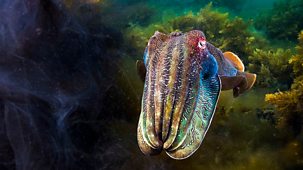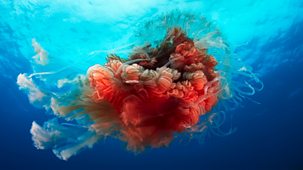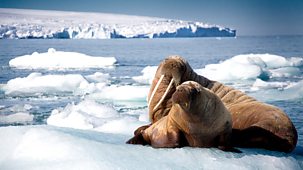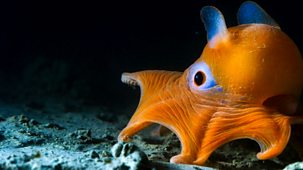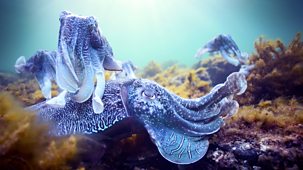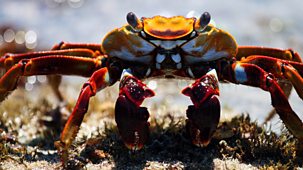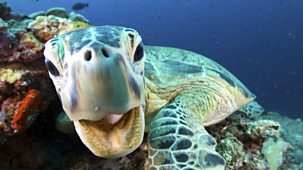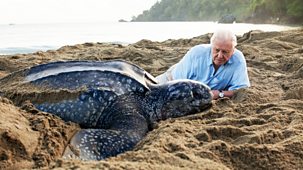
Series 1: 7. Our Blue Planet
While making Blue Planet II, we have explored parts of the ocean that nobody has been to before, encountered extraordinary animals and discovered new insights into how life thrives beneath the waves. But we have also witnessed the profound effects of human activity. The oceans are changing faster and in more ways than at any point in human history and now, for the first time, we understand why.\n\nIn this final episode, we uncover the impact that our modern lives are having on our best-loved characters from across the series, including devoted albatross parents unwittingly feeding their chicks discarded plastic and mother dolphins potentially exposing their newborn calves to pollutants through their contaminated milk. Scientists have even discovered that increasing noise levels may stop baby clownfish finding their way home.\n\nMany creatures are struggling to survive in today's oceans, and some changes in the ocean will require a global effort. While filming the stunning corals on the Great Barrier Reef's remote Lizard Island, the film crew witnessed a catastrophe. Warmer than normal seas caused the biggest coral bleaching event in human history, killing about 90 per cent of the branching corals at Lizard Island.\n\nBut the warming ocean could have an even more devastating effect. We travel to Antarctica on a unique expedition to discover how melting polar ice sheets could one day impact the lives of hundreds of millions of people around the world.\n\nYet, despite these devastating impacts, there is hope. Every year, billions of herring overwinter in the icy seas off Norway, but just 50 years ago they were almost wiped out by overfishing. Today, thanks to careful regulation, they have returned, creating one of the greatest spectacles in the ocean. Hundreds of giant humpback whales and one of the greatest gatherings of orcas on the planet feast on the herring - an extraordinary story of recovery.\n\nAround the world, individuals are also making a huge difference to the future of the ocean. In the Galapagos, one scientist has devoted much of his life to saving the largest fish in the sea - the whale shark. He is using the latest technology to unlock one of the ocean's biggest mysteries - where these elusive giants may give birth.\n\nIn the Caribbean, a community is reversing the fortune of giant leatherback turtles. Their numbers have dropped dramatically, by up to 90 per cent in some parts of the world, but here, volunteers are risking their lives to get turtle poachers to put down their weapons and instead protect the beach where these magnificent creatures nest. Through these valiant efforts, theirs is now one of the densest leatherback nesting beaches in the world.
Source: BBC 1
Most recent episodes of Blue Planet II
Blue Planet Ii
Series 1: 5. Green Seas
It's our green seas, not the blue, that bring life to our oceans. Here sunlight powers the growth of enchanted forests of kelp, mangroves and prairies of sea grass. They are the ...
23-11-2025
BBC 1
Blue Planet Ii
Series 1: 4. Big Blue
The big blue is the world's greatest wilderness, far from shore and many kilometres deep. It's a vast marine desert where there is little to eat and nowhere to hide. Yet it's ho ...
02-11-2025
BBC 1
Blue Planet Ii
Series 1: 2. The Deep
The deep is perhaps the most hostile environment on earth, at least to us - a world of crushing pressure, brutal cold and utter darkness. We have barely begun to explore it, and ...
19-10-2025
BBC 1
Blue Planet Ii
Oceans Of Wonder
This extended special of the nature documentary series journeys from the equator to the unexplored depths, meeting the best-loved characters from the series.
03-08-2025
BBC 1
Blue Planet Ii
Series 1: 7. Our Blue Planet
While making Blue Planet II, we have explored parts of the ocean that nobody has been to before, encountered extraordinary animals and discovered new insights into how life thri ...
09-03-2025
BBC 1
Blue Planet Ii
Series 1: 6. Coasts
On the coast, two worlds collide. Coasts are the most dynamic and challenging habitats in the ocean - that brings great rewards but also great danger. The extraordinary animals ...
03-03-2025
BBC 1
Blue Planet Ii
Series 1: 3. Coral Reefs
Corals build themselves homes of limestone in the warm, clear, shallow seas of the tropics. Their reefs occupy less than one tenth of one per cent of the ocean floor, yet they a ...
26-02-2025
BBC 1
Most popular episodes of Blue Planet II
Blue Planet Ii
Series 1: 7. Our Blue Planet
While making Blue Planet II, we have explored parts of the ocean that nobody has been to before, encountered extraordinary animals and discovered new insights into how life thri ...
09-03-2025
BBC 1
Blue Planet Ii
Series 1: 4. Big Blue
The big blue is the world's greatest wilderness, far from shore and many kilometres deep. It's a vast marine desert where there is little to eat and nowhere to hide. Yet it's ho ...
02-11-2025
BBC 1
Blue Planet Ii
Oceans Of Wonder
This extended special of the nature documentary series journeys from the equator to the unexplored depths, meeting the best-loved characters from the series.
03-08-2025
BBC 1
Blue Planet Ii
Series 1: 2. The Deep
The deep is perhaps the most hostile environment on earth, at least to us - a world of crushing pressure, brutal cold and utter darkness. We have barely begun to explore it, and ...
19-10-2025
BBC 1
Blue Planet Ii
Series 1: 3. Coral Reefs
Corals build themselves homes of limestone in the warm, clear, shallow seas of the tropics. Their reefs occupy less than one tenth of one per cent of the ocean floor, yet they a ...
26-02-2025
BBC 1
Blue Planet Ii
Series 1: 6. Coasts
On the coast, two worlds collide. Coasts are the most dynamic and challenging habitats in the ocean - that brings great rewards but also great danger. The extraordinary animals ...
03-03-2025
BBC 1
Blue Planet Ii
Series 1: 5. Green Seas
It's our green seas, not the blue, that bring life to our oceans. Here sunlight powers the growth of enchanted forests of kelp, mangroves and prairies of sea grass. They are the ...
23-11-2025
BBC 1


